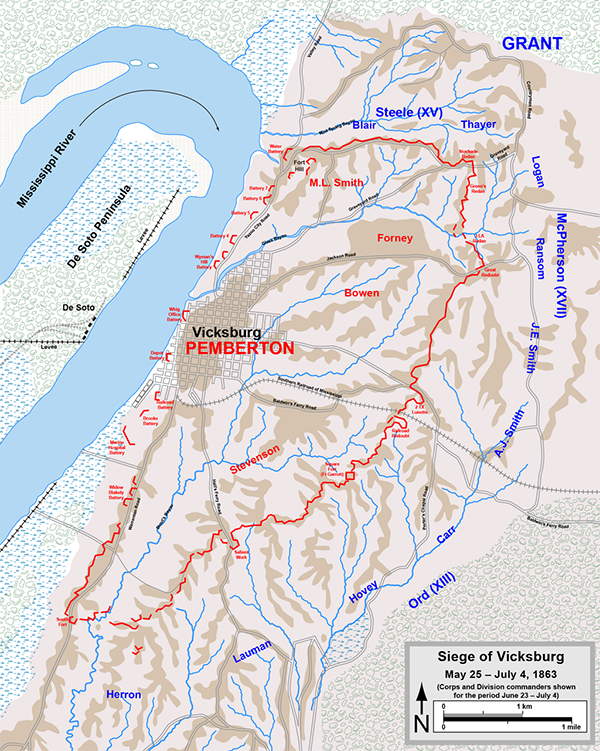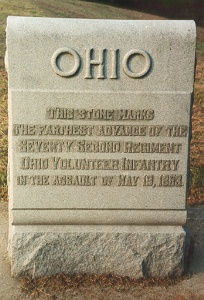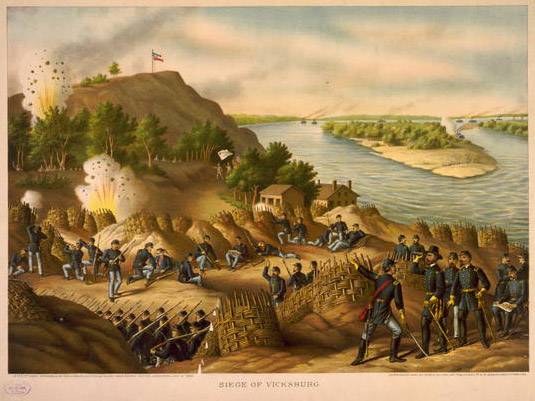Prairie Dog Village

(The Siege of Vicksburg. Map by Hal Jespersen).
They did not celebrate the 4th of July in Vicksburg for 81 years. Well, there is some controversy over that and there were some ceremonies some years. The times have changed, but the 4th is a day that no one really wants to remember in Vicksburg. Grant chased Pennsylvania-born Confederate commander John C. Pemberton back into the fortress town after crossing the Mississippi and advancing relentlessly northeast through Raymond and Jackson and Champion Hill. Then Grant turned and moved west as Pemberton slammed the gates of his last command.
On the 19th of May, Grant’s army arrived in front of Vicksburg and he launched an immediate attack. The 72nd OVI has a marker on the field from their part in it. The were located on the northeast corner of the Confederate defenses, near Graveyard Road.

Pemberton’s men had suffered two serious defeats in the last three days, and at Big Black River had broken and run.
Being amid the defenses that Pemberton had been building for more than half a year seemed to stiffen their spines, though. The terrain around Vicksburg was ideal for construction of strong defenses. The high ground was crossed by a series of streams that had eroded steep ravines, leaving a series of ridges that were studded with nine forts and linked y trenches and individual fighting positions.
A second and more methodical attack was conducted on 22 May, and it was done with enthusiasm but came to nothing. Having demonstrated to his men that additional frontal assaults were foolhardy, Grant decided to hunker down and conduct a regular siege.
What followed would be 47 days of hell for the citizens of the Gibraltar of the South.
Considering what was at stake, it is a bit surprising that Department of the West Commander Joe Johnston didn’t do something to try to relieve the city. If it fell, Texas and Arkansas would be lost. Grant had to be concerned with Johnston’s forces behind him, east of the Big Black River.
Johnston made a feint to cross the river, though it was half-hearted and too late. With Tecumseh Sherman sent to block him, Johnston delayed until it was too late to help Pemberton, whose troops and civilian residents of the town were starving. The continuous bombardment forced soldiers and civilians alike to dig caves in the bluff and live underground for protection.
The Union soldiers called the place a “prairie dog village,” since only the foolish would poke their heads up to look around.
Eventually, 70,000 Union men surrounded Vicksburg, with seven divisions under Sherman facing east to deal with any Confederate counterattack. The best Johnston could muster was 30,00 largely untrained men, and that may have added to his timidity.
A pal noted the other day that the frantic canal digging of the previous fall and winter had served to keep the union troops occupied. Idle hands are the devil’s something or other, he said.
Grant was not content to simply wait for famine to force the surrender of Vicksburg. In June, his men constructed a series of trenches just as elaborate as those of the defenders. Slowly these trenches crept closer and closer, and industrious engineers tunneled below them to plant and detonate mines. The first on was on the 25th of June, and to no particular effect except to further demoralize the Rebels. An accompanying Union assault was repulsed with heavy losses.
A second mine, on 1 July, had destroyed a Confederate fort, but had not been followed by an assault. Grant had decided to wait until his engineers had tunneled in several places, and a coordinated series of blasts could be conducted ahead of a general assault in early July.
I should note that elsewhere in America, Robert E. Lee was heading for a town called Gettysburg in southern Pennsylvania. e could explode a series of mines and use the confusion to launch a general assault along the line.
The final assault was not needed.
The town was in extremis. All the four-legged creatures had been slaughtered long before, and rats were being caught to augment dwindling stocks of grain. On 28 June, Pemberton received an anonymous note from his men requesting surrender, with the alternative being mass desertion. Pemberton considered a break-out, but his top commanders informed him the troops were too weakened to fight.
On the morning of July 3rd the white flags went up, and Pemberton met with Grant behind the lines. The two generals knew one another but the meeting was not a happy one. Grant insisted on unconditional surrender, and Pemberton demurred and departed. Grant then summoned his corps commanders and Flag Officer Porter for a huddle. They recommended that Pemberton’s forces be permitted to depart the city on the proviso that they go and make war no more under declaration of parole, or unless formally exchanged for Union prisoners.
After all, the Commanders pointed out, that would be 30,000 mouths they would not have to feed. Grant agreed and sent the revised terms to Pemberton, who accepted. The surrender of Vicksburg occurred on the 4th of July, which is why people there are a little sensitive about the day. Lee’s frontal assault on the Union lines had failed, Pickett’s Division had been slaughtered, and the Army of Northern Virginia was falling back in defeat.
There were a few loose ends to be tied up in the West, of course. But the surrender of one of the most important places in the Confederacy on that date was a massive blow to southern morale, and provided a crucial boost to that of the north. 2,166 officers and 27,230 men surrendered at Vicksburg, and within a few weeks were scattering across the south with their tales of the Union triumph.
The surrender of Vicksburg quickly led to the surrender of Port Hudson, now the last Confederate stronghold on the Mississippi. Once the garrison there were sure that Vicksburg had surrendered, they too threw in the towel on July 9th. The Mississippi was now clear for northern ships. Only one week later the first ship reached New Orleans from the north. The Confederacy was permanently split in two, and Arkansas and Texas lost.
There was still stiff resistance in the West, but capture of Vicksburg promoted U.S. Grant to the front rank of Union generals. As the Union armies approaching Chattanooga in northeastern Tennessee they began to encounter trouble. They were defeated at Chickamauga in September 1863, and Lincoln wanted a fighter in charge. He selected Sam Grant to command of all Union armies between the Mississippi river and the Alleghany Mountains, and ordered him to lift the siege of Chattanooga. Grant was on his way to supreme command, and eventually a meeting with Bobbie Lee at Appomattox.

(This lithograph recounts the 1863 battle at Vicksburg that took place on water and land. Based on the view of the De Soto Penninsula in the rear, this would be near where the 72nd OVI made their assault on 19 May, 1863 Prints and Photographs Division, Library of Congress. Reproduction Number LC-USZC4-1754).
Meanwhile, Joe Johnston avoided being trapped in Jackson by Tecumseh Sherman’s forces and escaped with his army, which was more than Pemberton had achieved. But now, all of central Mississippi was left under Sherman’s control. He used a subsequent operation against Meridian as a precursor for the scorched earth tactics he would perfect on the March to the Sea through the Georgia Campaign.
Between the devastation imposed on civilian populations, massive defensive works and marvelous technology, the Civil War was informing the world of what was to come in an era of mass conflict. The world just wasn’t quite prepared to deal with what was coming.
The war in Georgia was when Great Great Uncle Patrick got back in the fight, and Great Great Grandfather James left it, but I will have to leave that for another day.
Back in Washington, President Lincoln got the telegram about the fall of Vicksburg, and happily announced, “The Father of Waters again goes unvexed to the sea.”
Maybe the river does, but there are still some folks around those parts who are still a little peevish about the whole thing.
Copyright 2015 Vic Socotra
www.vicsocotra.com
Twitter: @jayare303
